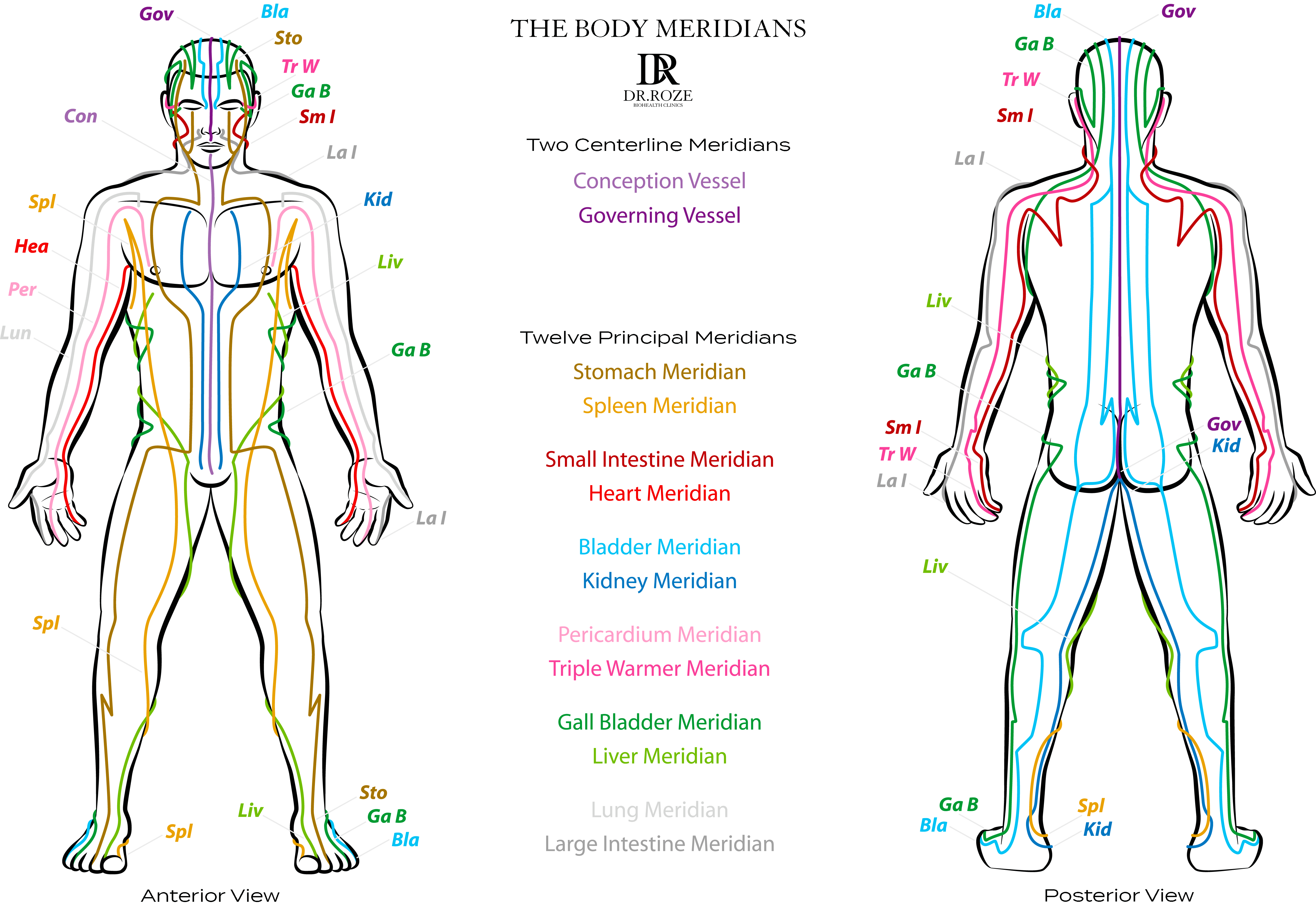Meridians play a central role in traditional Chinese medicine and are a perfect fit for yoga and mindfulness. They are the energy pathways or channels that crisscross the entire body. Our life energy, also known as Qi or Prana , flows through these energy channels. The meridians connect our organs with emotions and energy.
The twelve main meridians are: the l The liver, lung, large intestine, stomach, spleen, heart, small intestine, bladder, kidney, pericardium, triple heater, and gallbladder meridians . Each of these meridians plays a crucial role in our overall health and the health of its corresponding organ.
What many people don't know is that every meridian has both a physical and an emotional side. When a meridian becomes imbalanced, you'll notice it not only in your body but also in your emotions.

In this blog, we'll give you an overview of the 12 main meridians and discover how they contribute to a healthy and balanced life.
Liver meridian (LV) – energy and creativity
The liver meridian distributes Qi (energy) and regulates emotions. It supports creativity, patience, and the ability to plan and visualize. When it becomes unbalanced, it can lead to anger or frustration.
Lung Meridian (LU) – Breathing and Letting Go
The lung meridian governs breathing and plays a role in your immune system and skin. It is responsible for the circulation of Qi or Prana. Physically, it regulates oxygen absorption, and emotionally, it helps with processing grief and the ability to let go.
Large Intestine Meridian (LI) – Cleansing and Clarity
This meridian is associated with the elimination of waste. Mentally, it helps you release old patterns and emotional baggage, creating space for clarity and decisiveness.
Stomach Meridian (ST) – Digestion and Stability
The stomach meridian supports digestion and nutrient absorption. Psychologically, it influences worry and anxiety. When balanced, it brings contentment and stability in thought and feeling.
Spleen Meridian (SP) – Nourishment and Care
The Spleen meridian is responsible for the distribution of nutrients. Emotionally, it represents reflection, concentration, and nurturing. When disturbed, it can lead to excessive worry or anxiety.
Heart Meridian (HT) – circulation and joy
This meridian regulates blood circulation and supports emotions like joy, love, and connection. A strong heart meridian promotes inner peace and helps you live in harmony with yourself and others.
Small Intestine Meridian (SI) – Absorption and Discrimination
Physically, the small intestine meridian separates nutrients from waste. Mentally, it helps you distinguish between truth and illusion and supports clear decision-making.
Bladder Meridian (BL) – drainage and flexibility
The bladder meridian plays a role in the elimination of fluids and also influences the nervous system. Emotionally, it helps you cope flexibly with stress and change, and it increases your resilience.
Kidney Meridian (KI) – Energy and Courage
The kidney meridian is central to energy management and is associated with growth and reproduction. It is linked to the emotion of fear. When balanced, it strengthens courage, willpower, and confidence.
Pericardial Meridian (PC) also known as Blood circulation - protection and emotional balance
This meridian protects the heart, both physically and emotionally. It helps regulate blood circulation and protects you from emotional stress and trauma. It supports the processing of deep emotions.
Triple heater (SJ) – energy and communication
The triple heater meridian distributes energy throughout the body and regulates fluids. Emotionally, it helps manage stress and improve social relationships and communication.
Gallbladder Meridian (GB) – Digestion and Determination
The gallbladder meridian plays a role in the storage of bile and supports the digestive process. Mentally, it represents courage and assertiveness, helping you make powerful decisions.
The location of the different meridians can be found in the image below.
Image via: Roze Bio Health , The Chinese Meridian Theory.
But how do you use this information in a practical way?
Meridians and the Organ Clock
Why meridians are important for your well-being
Meridians demonstrate the strong connection between body and mind. A blockage can manifest physically as fatigue or tension, but equally emotionally, such as stress or sadness. By working with the meridians through yoga, breathing, or meditation, you support both sides simultaneously.
At Yogi Essentials, we believe that becoming aware of meridians is a valuable step in your yoga journey. It helps you connect more deeply with your body, better understand your emotions, and find balance in all areas of your life.
Frequently Asked Questions
What are the 12 meridians in traditional Chinese medicine?
The 12 meridians are energy pathways in the body that connect to our organs, such as the lungs, stomach, liver, and heart. They ensure that Qi (life energy) flows through the body, thus influencing both your physical and emotional health.
How do the meridians affect my health?
Each meridian has a physical and emotional function. For example, the liver meridian is involved not only in detoxification but also in emotions like anger and creativity. If a meridian becomes imbalanced, you can notice it in both your body and your mood.
Can you balance the meridians yourself?
Yes, you can! Yoga, breathing exercises, acupressure, and meditation are easy ways to support your meridians. Disciplines like acupuncture, cupping, and gua sha are also often used to remove blockages in the energy flow. For practical tips, you can also read about the organ clock.
How do the meridians work with the Chinese organ clock?
The organ clock shows at what times of day a specific meridian and its corresponding organ are most active. By aligning your activities, nutrition, and rest periods with this rhythm, you can enhance the functioning of the meridians.
Are meridians scientifically proven?
Although meridians aren't visible like blood vessels or nerve pathways, a growing body of research shows that energy points and pathways influence pain relief, relaxation, and stress reduction. Many people experience noticeable effects, although the science is still developing.








